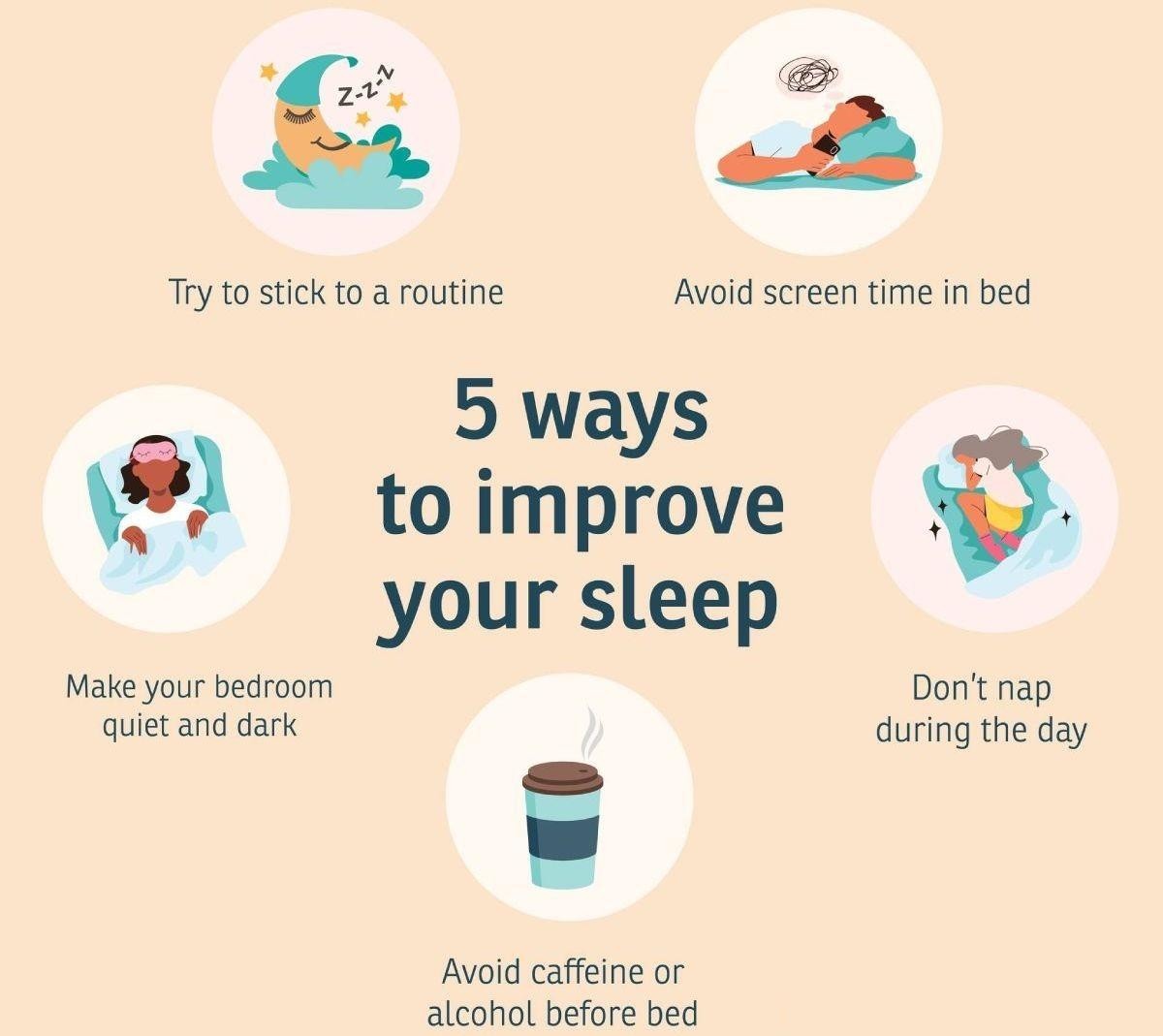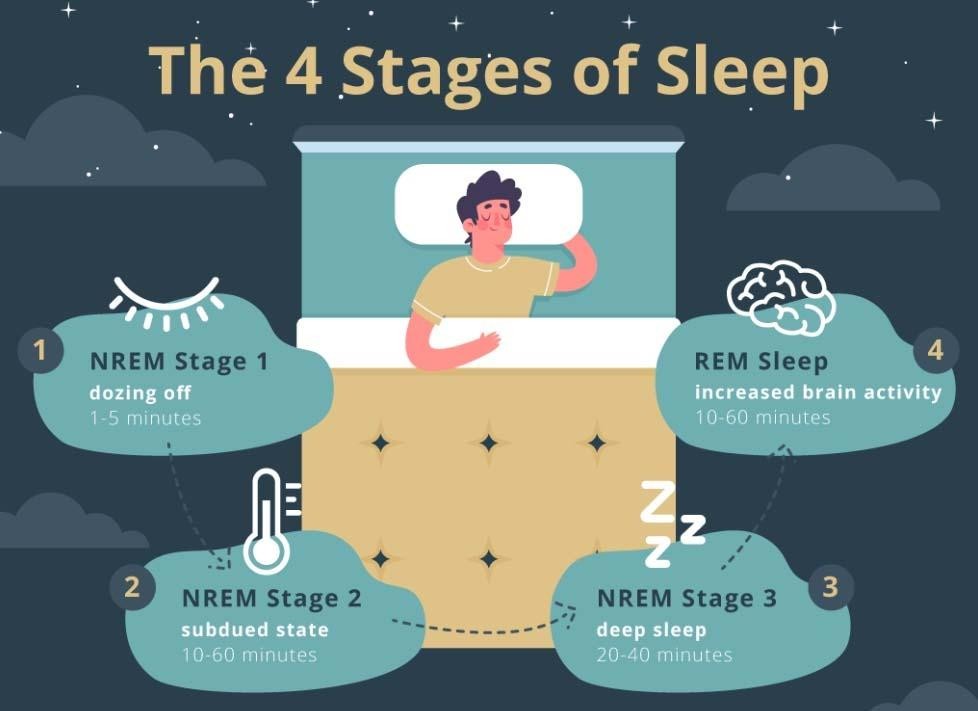How to get better sleep according to science
Improving Sleep Quality
Sleep is essential for physical and mental health However, by understanding the science behind sleep and implementing effective strategies, individuals can improve their sleep quality.
Strategies for Better Sleep
Establish a Consistent Sleep Schedule
- Develop a bedtime routine to signal the body that it’s time to sleep.

Create a Sleep-Conducive Environment
- Ensure the mattress and pillows are comfortable and supportive.
Limit Exposure to Screens Before Bed
Use blue light filtering glasses, apps, or software to reduce exposure.
Avoid Stimulating Activities Before Bed
Manage Stress and Anxiety
- Practice stress-reducing techniques, such as deep breathing or yoga.
- Write down concerns and tasks before bed to clear the mind.
Understanding Sleep Cycles
Sleep is a complex process that involves multiple stages, including deep sleep and REM (Rapid Eye Movement) sleep. These stages occur in 90-minute cycles throughout the night.

Stages of Sleep
- Deep Sleep: This stage is crucial for physical restoration, as it allows the body to repair and rejuvenate itself.
REM Sleep: This stage is important for mental restoration, as it helps consolidate memories, enhance creativity, and regulate mood.
Waking Up During the Right Stage
- Sleep tracking apps, such as Sleep Cycle, can monitor your sleep patterns and wake you up during a light sleep phase, helping you feel more refreshed and alert.
Benefits of Understanding Sleep Cycles
- Improved sleep quality: By understanding your sleep cycles, you can optimize your sleep patterns and wake up feeling more refreshed.
- Better mood regulation: Getting quality sleep can help regulate your mood and reduce stress and anxiety.
By understanding your sleep cycles and using tools like sleep tracking apps, you can take control of your sleep and wake up feeling refreshed and revitalized.
Establishing a Consistent Sleep Schedule

Benefits of a Consistent Sleep Schedule
Regulates melatonin release: Going to bed and waking up at the same time every day helps the body learn when to release melatonin, making it easier to fall asleep.
- Improves sleep quality: A consistent sleep schedule can lead to better sleep quality, increased energy, and improved mood.
- Reduces sleep disruptions: Sticking to a schedule, even on weekends, can help minimize sleep disruptions and maintain the body’s natural rhythm.
Tips for Maintaining a Consistent Sleep Schedule:
- Gradual adjustments: If needed, adjust the sleep schedule gradually to avoid disrupting the body’s natural rhythm.
By prioritizing a consistent sleep schedule, individuals can improve their sleep quality, increase energy levels, and enhance overall well-being.
Creating a Wind-Down Routine

The brain needs time to transition from problem-solving mode to sleep mode.
Tips for a Relaxing Wind-Down Routine
- Dim the lights: Dimming the lights an hour before bedtime can help increase melatonin production.
- Avoid screens: Avoiding screens or using blue-light filters can reduce the impact of bright light on melatonin production.
- Relaxing activities: Engage in relaxing activities, such as reading, meditation, or journaling, to calm the mind and body.
Avoid stimulating content: Avoid content that can stimulate the brain, such as intense movies or social media.
Benefits of a Wind-Down Routine
- Improved sleep quality: A consistent wind-down routine can help improve sleep quality and duration.
- Increased melatonin production: Dimming the lights and avoiding screens can help increase melatonin production.
By incorporating a wind-down routine into daily life, individuals can improve their sleep quality, reduce stress, and wake up feeling refreshed and revitalized.
Diet and Sleep
The food and drinks consumed, especially at night, can significantly impact sleep quality.

Foods and Drinks to Avoid
- Caffeine: Avoid consuming caffeine after 2 PM, as it can stay in the system for 6-10 hours and disrupt sleep.
Better Option:
- Light snacks: Opt for light snacks, such as yogurt, bananas, or a handful of nuts, which can promote relaxation and sleep.
Tips for a Sleep-Conducive Diet:
- Be mindful of portion sizes: Avoid overeating or consuming large amounts of liquids before bedtime.
- Choose sleep-promoting foods: Incorporate foods that promote sleep, such as tryptophan-rich foods, into your diet.
- Stay hydrated: Drink plenty of water throughout the day, but avoid excessive fluid intake before bedtime.
Prioritizing Sleep
Getting good sleep is not about achieving perfection but rather about creating consistent habits that support rest and relaxation.
Benefits of Good Sleep
- Mental clarity: Sleep is essential for mental clarity, emotional balance, and physical health.
- Increased energy: Waking up feeling refreshed and energized can improve overall well-being.
Tips for Improving Sleep
- Be consistent: Establish a consistent sleep schedule and bedtime routine.
The Importance of Sleep
- Better health: Good sleep is linked to improved physical and mental health.
- Increased productivity: Waking up feeling refreshed can improve productivity and overall quality of life.
By prioritizing sleep and making it a priority, individuals can experience the many benefits of good sleep and wake up feeling refreshed, revitalized, and ready to take on the day.
